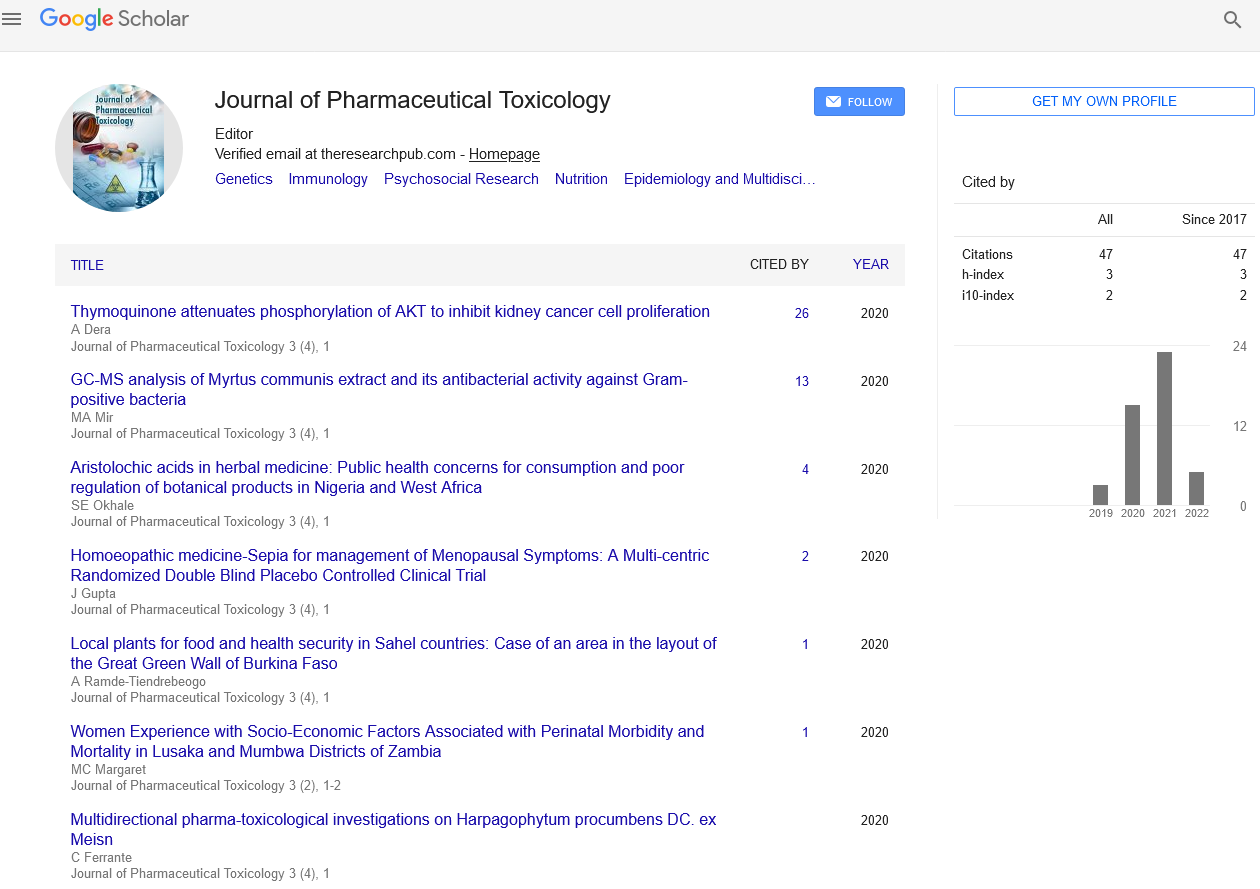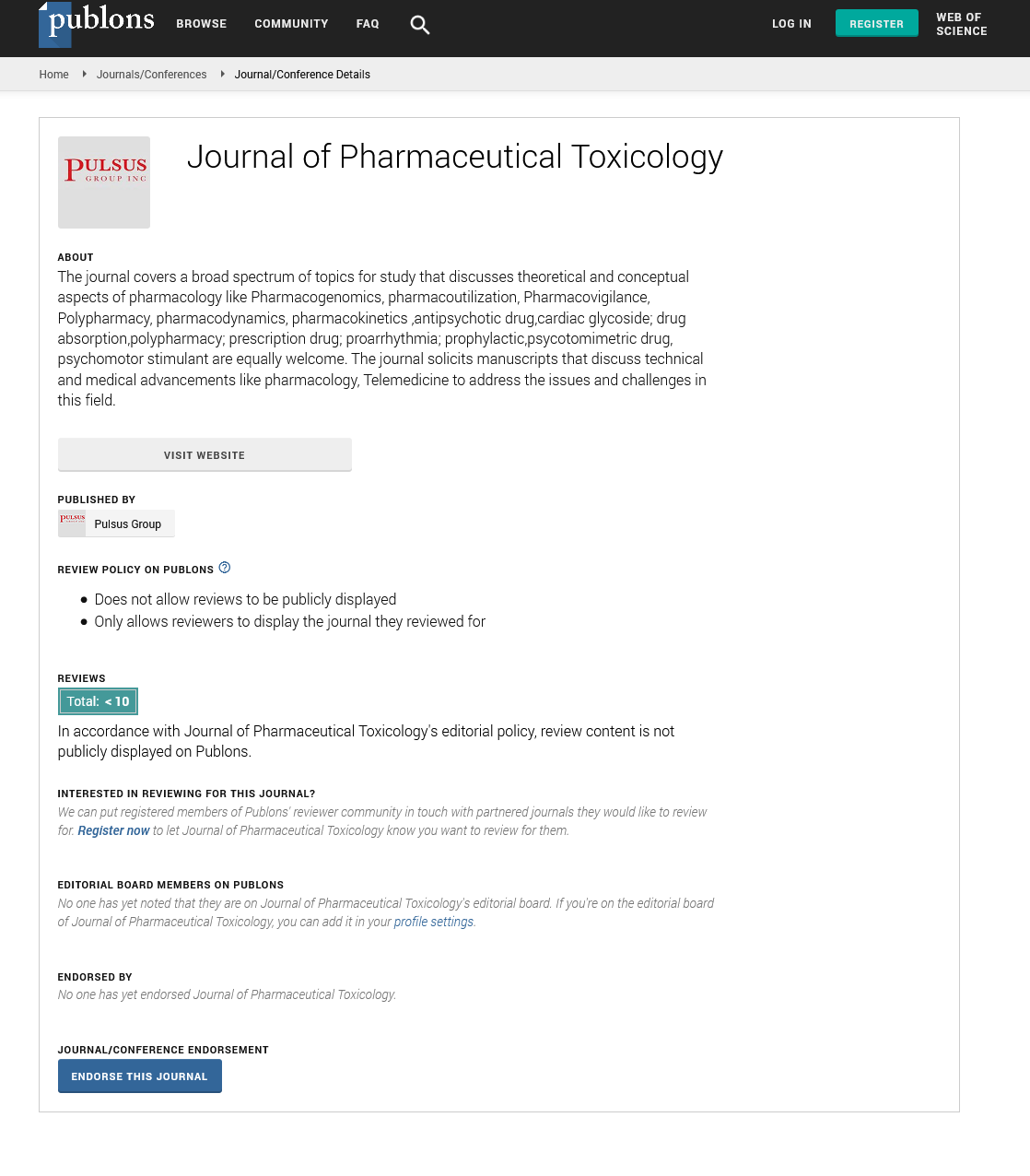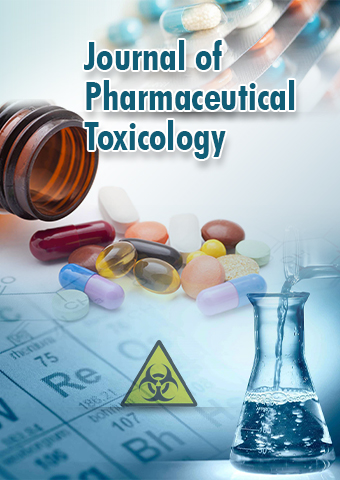Review Article - Journal of Pharmaceutical Toxicology (2023) Volume 6, Issue 2
Title: The potential of cannabidiol (CBD) as a treatment for anxiety disorders
Krizan Novale*
Department of Pharmacology and Experimental Therapeutics, University of Toledo, USA
Department of Pharmacology and Experimental Therapeutics, University of Toledo, USA
E-mail: krizan.novale@gmail.com
Received: 03-April-2023, Manuscript No. jpt-23-94550; Editor assigned: 5-April-2023, PreQC No. jpt-23-94550 (PQ); Reviewed: 19-April-2023, QC No. jpt-23-94550; Revised: 22-April-2023, Manuscript No. jpt-23- 94550 (R); Published: 28-April-2023, DOI: 10.37532/jpt.2023.6(2).25-28
Abstract
Anxiety disorders affect a significant portion of the population and can significantly impair quality of life. While there are several pharmacological treatments available, many individuals do not respond well to traditional medications or experience unwanted side effects. Recently, there has been increasing interest in the potential of cannabidiol (CBD), a non-psychoactive component of the Cannabis sativa plant, as a treatment for anxiety disorders. Preclinical studies have demonstrated that CBD has anxiolytic effects and may modulate the activity of serotonin receptors in the brain, which are important targets for traditional antidepressant and anxiolytic medications. In addition, CBD has been shown to have a favorable safety profile in humans, with few adverse effects reported in clinical trials
Keywords
Drug interactions • Side effects • Pharmacokinetics • Pharmacodynamics • Therapeutic index • Drug metabolism • Half-life • Pharmacology
Introduction
Several small-scale human studies have investigated the potential of CBD as a treatment for various anxiety disorders, including generalized anxiety disorder (GAD), social anxiety disorder (SAD), and post-traumatic stress disorder (PTSD). While the results of these studies are promising, larger, well-controlled clinical trials are needed to confirm the efficacy and safety of CBD as a treatment for anxiety disorders. Despite the need for further research, the growing interest in CBD as a potential treatment for anxiety disorders has led to the development of several CBD-based products, including oils, capsules, and tinctures. It is important to note that these products are not regulated by the FDA and may vary in quality and potency. Individuals interested in using CBD for anxiety should consult with a healthcare provider and only use products from reputable manufacturers [1].
Depression is a common mental health disorder affecting millions of people worldwide. While antidepressant medications have been effective in treating the symptoms of depression, some patients do not respond to these treatments. This phenomenon is known as treatment-resistant depression (TRD).AZ recently, there has been a growing interest in the development of novel antidepressants for the treatment of TRD. These drugs target different neurotransmitters and mechanisms than traditional antidepressants, providing an alternative treatment option for patients who have failed previous therapies. One such novel antidepressant is ketamine. Ketamine is an N-methyl-D-aspartate (NMDA) receptor antagonist that has shown promising results in clinical trials for TRD. Studies have shown that ketamine rapidly reduces depressive symptoms, with some patients experiencing significant improvement within hours of administration. Another promising novel antidepressant is ketamine. Ketamine is a nasal spray formulation of ketamine that was recently approved by the FDA for the treatment of TRD. Clinical trials have shown that ketamine provides rapid relief of depressive symptoms and can be effective in patients who have not responded to other treatments. Other novel antidepressants currently under investigation include psilocybin, a compound found in magic mushrooms, and dextromethorphan, a cough suppressant that also acts as an NMDA receptor antagonist [2].
Discussion
While the development of novel antidepressants provides hope for patients with TRD, further research is needed to fully understand their efficacy and potential side effects. With continued investigation, these drugs may provide a valuable alternative treatment option for patients with TRD who have not responded to traditional antidepressant therapies. Anxiety disorders affect a significant portion of the population and can lead to significant impairments in daily functioning. While traditional treatments, such as selective serotonin reuptake inhibitors (SSRIs), can be effective, they may also cause unwanted side effects [3]. Cannabidiol (CBD), a nonpsychoactive compound found in the cannabis plant, has shown promise as a potential treatment for anxiety. Studies have suggested that CBD may interact with the end cannabinoid system, which plays a role in regulating anxiety, and may also affect the levels of neurotransmitters such as serotonin and glutamate.
Several clinical trials have been conducted to evaluate the efficacy of CBD in treating anxiety. One study found that CBD was effective in reducing anxiety in patients with social anxiety disorder, while another study found that CBD reduced anxiety in individuals with posttraumatic stress disorder (PTSD).CBD has also been shown to have a favorable side-effect profile, with few reported adverse effects. However, more research is needed to fully understand the potential of CBD as a treatment for anxiety and to determine optimal dosing regimens. It should be noted that CBD is not a cure for anxiety, and individuals should always consult with their healthcare provider before starting any new treatment regimen. Nevertheless, the promising findings from research studies suggest that CBD may provide an alternative treatment option for those with anxiety disorders. Anxiety disorders are among the most prevalent mental health conditions, affecting millions of people worldwide. Despite the availability of various pharmacological treatments, many patients continue to experience persistent symptoms and adverse effects. There is growing interest in the potential therapeutic benefits of cannabidiol (CBD), a non-intoxicating compound derived from the cannabis plant, for the management of anxiety disorders [4].
Several preclinical and clinical studies have reported that CBD may have anxiolytic properties, possibly due to its ability to modulate the end cannabinoid system and interact with serotonin receptors. A recent systematic review and meta-analysis of randomized controlled trials found that CBD was more effective than placebo in reducing anxiety symptoms in individuals with social anxiety disorder, generalized anxiety disorder, and post-traumatic stress disorder. Moreover, CBD was generally well-tolerated, with minimal adverse effects reported. However, more research is needed to determine the optimal dosing and duration of CBD treatment, as well as its long-term safety and efficacy.CBD may hold promise as a novel therapeutic option for anxiety disorders. Further research is warranted to fully elucidate its mechanisms of action and potential clinical applications, as well as to address any remaining safety concerns. Chronic pain affects millions of people worldwide and can have a significant impact on their quality of life. Despite the availability of several pain management options, many patients continue to experience inadequate pain relief or suffer from adverse effects of the drugs. The end cannabinoid system (ECS) has emerged as a potential target for the treatment of chronic pain [5].
Cannabinoids, which are compounds found in the cannabis plant, interact with the ECS and can modulate pain perception. Cannabidiol (CBD) and delta-9-tetrahydrocannabinol (THC) are the most well-known cannabinoids and have been studied extensively for their analgesic effects. CBD is a non-psychoactive compound that has shown promise in treating neuropathic pain, while THC has been shown to be effective in managing nociceptive pain. Several clinical trials have investigated the use of cannabinoids in chronic pain management. A meta-analysis of these studies suggested that cannabinoids were effective in reducing chronic pain and improving patient quality of life. However, the optimal dose and route of administration of cannabinoids for pain management remain unclear [6].
Despite the potential benefits of cannabinoids in chronic pain management, there are concerns about their side effects and abuse potential. It is important for clinicians to carefully consider the risks and benefits of cannabinoids before prescribing them to patients. In conclusion, cannabinoids have shown promise in the treatment of chronic pain, but further research is needed to determine the optimal dosing and administration methods. Clinicians should consider the potential risks and benefits of cannabinoids when managing chronic pain patients [7].
Neurological disorders such as Alzheimer’s disease, Parkinson’s disease, and multiple sclerosis pose a significant public health challenge worldwide. Despite decades of research, the available treatments for these disorders have limited efficacy and are associated with numerous side effects. Therefore, there is a need to develop novel therapeutics that can effectively treat these disorders with minimal adverse effects [8]. Natural compounds derived from plants, animals, and microorganisms have gained increasing attention as potential sources of novel therapeutics for neurological disorders. These compounds possess various bioactive properties such as anti-inflammatory, anti-oxidant, and anti-apoptotic activities that can modulate key pathways involved in the development and progression of neurological disorders. Several natural compounds such as curcumin, resveratrol, and epigallocatechin gallate (EGCG) have demonstrated promising therapeutic potential in preclinical studies for neurological disorders [9]. These compounds have been shown to improve cognitive function, reduce inflammation and oxidative stress, and prevent neuronal damage in various animal models of neurological disorders. However, further studies are needed to elucidate the molecular mechanisms underlying the therapeutic effects of natural compounds and to determine their safety and efficacy in human clinical trials. Additionally, the development of drug delivery systems that can improve the bioavailability and targeted delivery of these compounds to the central nervous system is essential for their successful clinical translation [10].
Conclusion
In conclusion, natural compounds represent a promising source of novel therapeutics for neurological disorders, and their exploration may lead to the development of safe and effective drugs that can improve the lives of millions of patients suffering from these debilitating conditions. Depression is a common and debilitating mental illness that affects millions of people worldwide. While therapy and lifestyle changes can be effective in treating depression, antidepressant medication is often used as a firstline treatment option. Antidepressants work by altering the levels of neurotransmitters in the brain, such as serotonin and norepinephrine, which are thought to be involved in regulating mood. Selective serotonin reuptake inhibitors (SSRIs) are the most commonly prescribed class of antidepressants. They include drugs like fluoxetine (Prozac) and sertraline (Zoloft), and are generally well-tolerated with relatively mild side effects. Other classes of antidepressants, such as tricyclic antidepressants and monoamine oxidase inhibitors, are less commonly used due to their potential for more serious side effects. While antidepressants can be effective in reducing symptoms of depression, they are not a cure and should always be used in conjunction with therapy and other treatment modalities. It is important to note that not all antidepressants work for everyone, and it may take some trial and error to find the right medication and dosage. Additionally, there has been some controversy surrounding the use of antidepressants in recent years, with some studies suggesting that they may not be more effective than placebo for mild to moderate depression. However, for more severe cases of depression, antidepressants can be a crucial tool in helping individuals manage their symptoms and improve their quality of life. Overall, antidepressants play an important role in the treatment of depression and can be a valuable tool in helping individuals manages their symptoms. However, it is important for individuals to work closely with their healthcare providers to determine the best course of treatment for their individual needs.
Conflict of Interest
None
Acknowledgement
None
References
- Chen X, Ning J, Wang J. The effect of atorvastatin on lipid metabolism in diabetic patients. Chin Med J. 19,215-216 (2010).
- Le L, Liu J. The analysis of adverse reaction and prevention countermeasures of statins. Mod Med. 26,1166-1168 (2014).
- Liao Y, Chen N. The observation of curative effect of Xuezhikang capsule with simvastatin for type2 diabetic hyperglycemia. Chin Med J. 5,44-45 (2010).
- Liu Y, Dong W. Effect of Xuezhikang and simvastatin on hypedipemia of non-insulin dependent diabete. J Hainan Med Univ. 19:3-4 (2008).
- Lanfan L, ZurongD. The observation of curative effect of Xuezhikang capsule for type2 diabetic hyperlipemia. Chin J Integr Med. 5,293-294 (2005).
- Zhe W. The observation of curative effect of Xuezhikang capsule with atorvastatin for diabetic hyperlipemia. J Chin Med Assoc. 10,16-17 (2012).
- Yang Y. The observation of curative effect of Xuezhikang capsule for type2 diabetic hyperlipemia. Chin J Integr Med. 17,1646-1647 (2008).
- Zhang S, Chen W. The observation of curative effect of Xuezhikang capsule for elderly diabetic hyperlipemia. Chin Med J. 5,1490150 (2010).
- Tongcui T, Bihui L. Effect of Xuezhikang on glucose metabolism of type 2 diabetes mellitus. Chin J Integr Med. 11,190-192 (2002).
- Chen W, Yang J, Ma G. The observation of curative effect of Xuezhikang capsule for diabetic hyperlipemia. J Pharm Sci. 15,146 (2000).
Google Scholar, Crossref, Indexed at
Google Scholar, Crossref, Indexed at
Google Scholar, Crossref, Indexed at
Google Scholar, Crossref, Indexed at
Google Scholar, Crossref, Indexed at
Google Scholar, Crossref, Indexed at
Google Scholar, Crossref, Indexed at
Google Scholar, Crossref, Indexed at


